

Why Malthus Got His Forecast Wrong. Most of us have heard that Thomas Malthus made a forecast in 1798 that the world would run short of food.
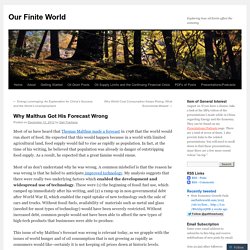
He expected that this would happen because in a world with limited agricultural land, food supply would fail to rise as rapidly as population. In fact, at the time of his writing, he believed that population was already in danger of outstripping food supply. As a result, he expected that a great famine would ensue. Most of us don’t understand why he was wrong. A common misbelief is that the reason he was wrong is that he failed to anticipate improved technology. This issue of why Malthus’s forecast was wrong is relevant today, as we grapple with the issues of world hunger and of oil consumption that is not growing as rapidly as consumers would like–certainly it is not keeping oil prices down at historic levels.
What Malthus Didn’t Anticipate Malthus was writing immediately before fossil fuel use started to ramp up. Figure 1. Figure 4. Tentative Conclusion Figure 5. Looking Ahead. Miracles Of World War 1: Thursday December 24, 1914, Sunday November 14, 1915, & Sunday May 13, 1917. The military conflict that lasted between August 1914 to November 1918, which involved many of the countries of Europe as well the United States and other nations throughout the world.

Perfectly Preserved First World War Trenches Discovered World War I was one of the most violent and destructive wars in European history. Of the 65 million men who were mobilized, more than 10 million were killed and more than 20 million wounded. Luxemburgism. Luxemburgism is a variant of Marxist revolutionary theory based on the writings of Rosa Luxemburg.
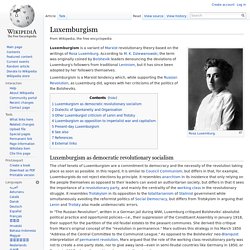
According to M. K. Dziewanowski, the term was originally coined by Bolshevik leaders denouncing the deviations of Luxemburg's followers from traditional Leninism, but it has since been adopted by her followers themselves. Geneva Congress (1866) Universal League for the Material Elevation of the Industrious Classes. The Universal League for the Material Elevation of the Industrious Classes was a 19th Century English political movement and organization.
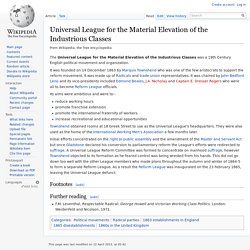
Its aims were ambitious and were to:- Anarchist communism. Some forms of anarchist communism such as insurrectionary anarchism are strongly influenced by egoism and radical individualism, believing anarcho-communism is the best social system for the realization of individual freedom.[13][14][15][16] Some anarcho-communists view anarcho-communism as a way of reconciling the opposition between the individual and society.[17][18][19][20][21] Anarcho-communism developed out of radical socialist currents after the French Revolution[22][23] but was first formulated as such in the Italian section of the First International.[24] The theoretical work of Peter Kropotkin took importance later as it expanded and developed pro-organizationalist and insurrectionary anti-organizationalist sections.[25] History[edit] Early developments[edit]
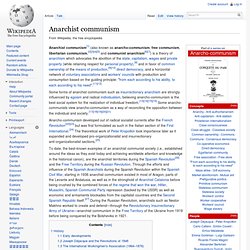
Libertarian socialism. Overview[edit] Libertarian socialism is a Western philosophy with diverse interpretations, though some general commonalities can be found in its many incarnations.
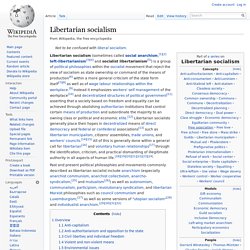
Its proponents generally advocate a worker-oriented system of production and organization in the workplace that in some aspects radically departs from neoclassical economics in favor of democratic cooperatives or common ownership of the means of production (socialism).[33] They propose that this economic system be executed in a manner that attempts to maximize the liberty of individuals and minimize concentration of power or authority (libertarianism). Left-wing uprisings against the Bolsheviks. The left-wing uprisings against the Bolsheviks were a series of rebellions and uprisings against the Bolsheviks by rival left-wing parties that started soon after the October Revolution, continued through the Russian Civil War, and lasted into the first few years of Soviet rule.
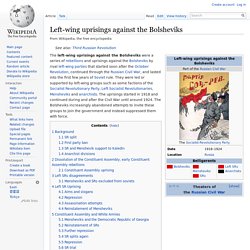
They were led or supported by left-wing groups such as some factions of the Socialist Revolutionary Party, Left Socialist Revolutionaries, Mensheviks and anarchists. The uprisings started in 1918 and continued during and after the Civil War until around 1924. The Bolsheviks increasingly abandoned attempts to invite these groups to join the government and instead suppressed them with force. “Enemies who never were”: Stalin, Yezhov, and the Great Purges, 1936-1938. Nikolai Ivanovich Bukharin, the prominent Bolshevik theorist, and one of the most high-profile victims of the Great Purges.

(Photo credit: Wikipedia) In March 1938, at the height of what would be termed the “Great Purges” or the “Great Terror”, Nikolai Ivanovich Bukharin, the prominent Bolshevik theorist and leading member of the Communist Party of the Soviet Union (hereafter CPSU), was found guilty of conspiracy in relation to the murder of Sergei Kirov, the Leningrad party chief, who was killed in 1934. Anti-Communism: a mask for reaction and repression » pa. Anti-Communism and anti-radicalism in the U.S. have always followed the patterns long established by color racism.
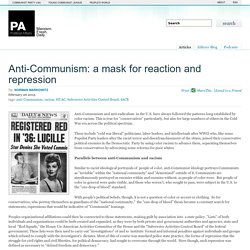
This is true for "conservatives" particularly, but also for large numbers of others in the Cold War era across the political spectrum. These include "cold war liberal" politicians, labor leaders, and intellectuals after WWII who, like some Populist Party leaders after the racist terror and disenfranchisement of the 1890s, joined their conservative political enemies in the Democratic Party by using color racism to advance them, separating themselves from conservatives by advocating some reforms for poor whites Parallels between anti-Communism and racism Similar to racist ideological portrayals of people of color, anti-Communist ideology portrays Communists as "invisible" within the "national community" and "demonized" outside of it. Communists are simultaneously portrayed as enemies within and enemies without, as people of color were.
Anti-Communism: a mask for reaction and repression » pa. Wake Up to the Smell of Class Struggle ☭ Communist International, August 1936 The Development of the Democratic Revolution in Spain By J.
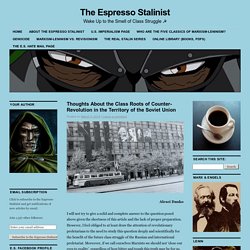
HernandezI. Economic Sabotage by the Big Bourgeoisie and Landowners. Wake Up to the Smell of Class Struggle ☭ Moscow Trials: August 22 (morning) August 22 (morning session) History of the C.P.S.U.(B.) Page 1. Lalkar: The Significance of the September 11th Events. Lalkar: 50 years after the death of Joseph Vissarionovich Djugashvili Stalin. MOLOTOV'S MEMOIRS. Winter 2006 Historical Reprint series COMPASS For Communist League (UK) No 108: October 1993.
Moscow Trials: Court Proceedings. Pravda's mistakes on the Moscow Trials. [Pravda's mistakes on the trial of the Zinovievites and Trotskyites] Written: September 6, 1936 (Sent from Sochi on 6 September at 4:05 a.m. (RGASPI, f. 558, op. Primitive accumulation, accumulation by dispossession, accumulation by ‘extra-economic’ means. Primitive accumulation, accumulation by dispossession, accumulation by ‘extra-economic’ means. Economic Manuscripts: Capital Vol. I - Chapter Thirty Two. Why Trotksy’s politics achieved nothing solid. Why he failed as a long-term leader. How he left behind a poisoned legacy by Gwydion M. Williams While it’s a bit much to say that the last quarter of the 20th century history was distorted by one man’s vanity, Trotskyism definitely did play a large and negative role in the 1970s. Back then, the West’s ruling class was confused and scared and open to significant change. Trotskyism with its massive misunderstandings served as a blocker of serious radicalism.
The Trotskyist argument and complaint is that they had wonderful ideas but that people failed to follow them. Trotskyism emerged as a distinct movement in the 1920s, claiming that the grand legacy of the October Revolution had been betrayed by the existing Bolshevik leadership. Radical movements usually begin with fringe intellectuals, propagate mostly among university students and sometimes grow into substantial political forces that can incorporate all sorts of wildly different people. So where did it all go wrong? References [G] [ From Socialist to Post-Socialist Primitive Accumulation - Maria Chehonadskih. On Trotskyism - PRIMITIVE SOCIALIST ACCUMULATION AND PROBLEMS OF THE TRANSITION. Anarchism - KarlMarx.net. Preobrazhensky’s Theory of Socialist Development - KarlMarx.net. Fredy Perlman Reference Archive. Address to Revolutionaries of Algeria and of All Countries (Situationist International) Towards%20a%20history%20of%20the%20KAPD.pdf. Japanese Communist Party. Anti-Comintern Pact.
Japanese Communist Party. Ursula Kuczynski. Ursula Ruth Kuczynski (15 May 1907, Schöneberg, Prussia, German Empire – 7 July 2000, Berlin, Germany,[1] also known as Ruth Werner, Ursula Beurton and Ursula Hamburger) was a German author and spy who worked for the Soviet Union.[2][3] Richard Sorge. P.18-9. International Communism (Communist Designs on Indonesia and the Pacific Frontier): Staff Consultation With Gen. Charles A. Willoughby; Former Chief of Intelligence, Far Eastern Command, Under General Douglas Macarthur.
English-language press of the Communist Party USA. Committee for a Democratic Far Eastern Policy - KeyWiki. Erskine Caldwell. Internet Archive Search: subject:"Communism. Full text of "Report on Civil Rights Congress as a communist front organization. Investigation of un-American activities in the United States, Committee on Un-American Activities, House of Representatives, Eightieth Congress, first session. Public law 601. Committee for a Democratic Far Eastern Policy - KeyWiki. Unavailable in your country. Women in Communist Russia 1917-1945. What Happened to Religion During the Communist Rule of Russia?
Discussions with Einstein on Epistemological Problems in Atomic Physics. Emma Goldman: Anarchism and Other Essays. Red Republicans and Lincoln’s Marxists: Marxism in the Civil War. REVOLUTION AND RELIGION: The Fight for Emancipation and the Role of Religion - A Dialogue Between Cornel West & Bob Avakian. A Statement from the Revolutionary Communist Party: ON THE STRATEGY FOR REVOLUTION. Revolution revcom.us. The Maoists of #Ferguson: Why the Media Blackout? Maoists kill 1, release other abducted villagers in Chhattisgarh. Maoism versus Marxism. The Autobiography of Nicolae Ceausescu. The Autobiography of Nicolae Ceausescu. Nicolae Ceausescu: The Last Days of a Dictator. Amerasia.
Amazon. Collision 3 - Rebekah Alessi, Daniel Berrigan, Bill Bissett, Dennis Brutus, Crescenzio Cane, Neeli Cherkovski, Roque Dalton, James H. Forest, Raffael DeGruttola, Nicolás Guillén, Jack Hirschman, Mavel Hussein, John Landry, Paul Laraque, Josaphat Large, Ja. Communist Revolutions in the PNA & Israel. Foundations of Modern Social Theory - Audio - Download free content from Yale University.